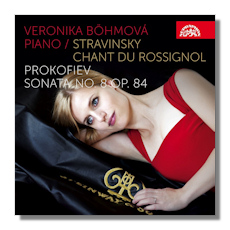
The Internet's Premier Classical Music Source
Related Links
-
Prokofieff Reviews
Stravinsky Reviews - Latest Reviews
- More Reviews
-
By Composer
-
Collections
DVD & Blu-ray
Books
Concert Reviews
Articles/Interviews
Software
Audio
Search Amazon
Recommended Links
Site News
 CD Review
CD Review
Russian Piano Works

- Igor Stravinsky:
- Chant du rossignol (The Song of the Nightingale)
- Four Etudes, Op. 7
- Serge Prokofieff:
- Piano Sonata #8 in B Flat Major, Op. 84
- Four Etudes, Op. 2
Veronika Böhmová, piano
Supraphon SU4148-2 68m
This is an unusual disc: it contains forty minutes of mostly top-notch Prokofiev and twenty-eight minutes of what is arguably middling Stravinsky, which Supraphon has given top billing. The main Stravinsky offering is Chant du Rossignol (1917), an arrangement of a symphonic poem of the same name that was derived from Stravinsky's The Nightingale (1908-14), which was based on Hans Christian Andersen's likewise titled fairytale. Thus, the piano version is a sort of recycled, twice-transformed work. The Four Etudes, Op. 7 (1908), are somewhat derivative, as their sound world often suggests Scriabin. Prokofiev's Eighth Sonata (1944) is a profound if mostly gentle work, perhaps the finest of the three so-called War Sonatas. Prokofiev's Four Etudes (1909), are strong early works, though not quite masterly. Yet, it is not Prokofiev's music that most inspires the young Czech pianist Veronika Böhmová, it is Stravinsky's – hence, Supraphon's not so unwise marketing decision.
Böhmová (b. 1985) has won several prizes in important international piano competitions and is active both as a recitalist and soloist with major orchestras across the globe. She has studied with Ivan Klansky, Arkadi Zenziper and Marie Simkova-Kotrcova. From the evidence offered on this disc, I would say she could well develop a highly successful concert career. Stravinsky's often tricky piano textures and difficult writing play into her considerable interpretive and technical strengths: the livelier music sounds colorful, playful and very pianistic, as if this version surrenders little in the reduction from orchestra. The slower music – the second movement (The Two Nightingales) in particular, is subtly rendered, flowing naturally, suggesting mystery and hypnotic exoticism. Incidentally, this is apparently the first time this work has been recorded. Böhmová seems to get the most out of the Four Etudes, wisely not playing down the connection to Scriabin. These are rarely recorded works as well, and so for Stravinsky mavens this disc would seem to be of great interest.
Böhmová's Prokofiev is good too, if not quite on the same level as her Stravinsky. Her Prokofiev Eighth Sonata is given broad tempos in the outer movements, which can be mostly a good thing, but occasionally the phrasing sounds a bit mechanical in the first movement, and the finale needs a little more animation. The Four Etudes get that animation and quite convincingly too. The D minor First is colorful and thrilling in her hands and the extraordinarily difficult Third, in C minor, seems to offer no significant challenges to Böhmová, who clearly possesses an all-encompassing technique. All in all, this is a splendid disc. True, you can find a better Prokofiev Eighth from Glemser, Giltburg or Richter, but everything else here is top-notch. The sound is a bit shrill in the upper register, but this disc must still be regarded as quite an impressive introduction to a talented young pianist.
Copyright © 2014, Robert Cummings





















